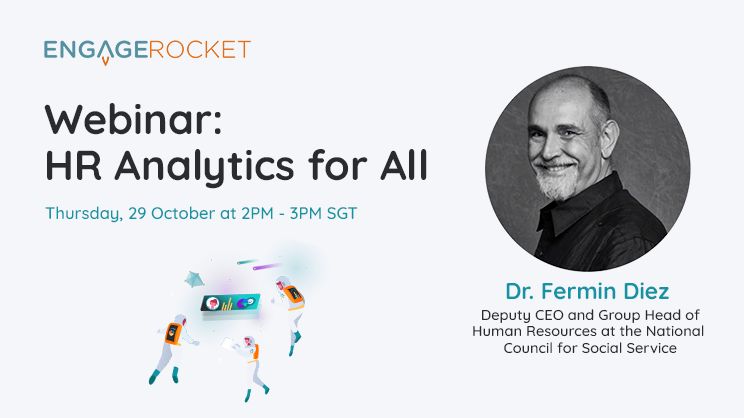![]()
Professor Fermin Diez
Dr. Fermin Diez has more than 35 years of experience in human resources, which includes consulting, corporate and academic roles in 40 countries in all continents.
As a consultant he has advised major multinationals, large local companies and public sector organisations at the Board and C-Suite levels. He has also managed the P&L in several geographical locations and businesses. As an HR leader, he has been Regional Head of HR for two large MNCs in AsiaPac and in Latin America.
He is currently Deputy CEO and Group Head of Human Resources for Singapore’s National Council for Social Service. He is also an Adjunct Professor at Singapore Management University and at Nanyang Technological University and is co-author of three books: ‘Human Capital and Global Business Strategy’, ‘The Remuneration Handbook: International Edition’ and ‘Fundamentals of HR Analytics’.
Even though Singapore may feel safe for many Singaporeans, we operate in a country with a strong reliance on an open economy. The COVID-19 situation in other countries is very different to ours - and as such we need to be wary of international developments, says Professor Diez.
Businesses in Singapore are adopting measures such as split teams, which Professor Diez is explains is important, but another pressing issue that needs to addressed is managing key business objectives through your people strategy.
Analytics can aid in many ways - but instant communication is where Professor Diez sees the greatest value of people analytics. Pulse surveys come to mind immediately, with their ability to take advantage of our digital world and provide more frequent data points to make decisions based on.
Comparing pulse surveys to surveys meant for market research - Professor Diez explains that employees will remember how their organisations behave in this period. Any indication that their organisation does not value their employee's sentiment, especially in such a sensitive time will be a red flag.
The only way to avoid an "exodus" of talent once the circuit-breaking measures are lifted is to focus on the employee experience of adjusting to remote work, and developing measures to keep engaging them through this period.
Take a People First strategy. Many companies are expected to struggle in this period - and may have to make the difficult decision to cut their headcount or the salaries of their employees. But which decision is the right one?|
Understanding what preferences your employees have with regard to such policy changes is vital for retaining their trust in the company.
If the economic situation leaves your management with no easy choices - one way to keep employees engaged is to simply ask them on what policies they are willing to adapt to.
Professor Diez elaborates that asking such hard questions demonstrates leadership in responding to your employee's sentiments, and augments your company culture. Cutting salary before cutting people is almost always the right choice, but key sectors of the economy that rely on commission-based compensation will lose out in many ways. Paying careful attention to whether cutting salary allows your employees to meet their daily needs is vital, as you may otherwise be leaving these individuals in a difficult position.

Beyond developing a gauge of how leaders should respond in such a crisis, pulse surveys can be a tool to check in with the emotional well-being of employees. In such a sensitive situation, having confidence that your employees do believe in your management's ability to lead during this crisis is extremely valuable.
Professor Diez explains that one debate that has continued for years - which is to allow employees to work from home, wherever possible - will end. A world where we have to adapt to remote working for a period as long as three years will be a world that cannot adhere to the conventions of today.
People can demonstrate that they can be productive working from home, as they are now. Having requirements on employees to clock in and out at a physical office will not be easily tolerated, especially if much of the world has adapted to this reality. Even when our world recovers from this situation - our workplaces have to place digital experiences at the forefront for their employees. Remote work policies will be almost necessary.
Leaders should also not lock themselves into decisions. Scenario planning is one aspect of business continuity planning, where you build several different responses based on your best case and worst case scenarios. Politicians may lead us to believe that the COVID-19 crisis may end in a matter of weeks, says Professor Diez, but organisations have to be resilient and develop their plans in case things don't go as planned. Having sufficient plans can lead to a much faster and strong economic recovery.
Professor Diez also adds - consider pivoting your business. If living in a world where everyone has to consistently adopt distancing measures to prevent healthcare systems from collapsing - many businesses can no longer exist. Professor Diez gives the example of movie theatres and cruise ships, i.e. businesses that are reliant on a community of people to jointly engage in an experience. The reality is, communities will have to be distributed and remote - and this is entirely possible with technology we currently have available.
As leaders and HR managers, we have heard about the importance of engaging with our employees especially so in this year with the big transformation in the workplace. As we collect feedback from our employees, let us learn how to analyse the data which can improve the organisation's workforce performance.
In this webinar with Dr. Fermin Diez, we will talk about how all HR folks, even those who are "not numbers people", can be more HR Analytical, armed with readily-available tools such as excel, a little knowledge of statistics and finance, and a framework that we will cover during the session.

Get your copy of Dr Fermin Diez's book - Fundamentals of HR Analytics: A Manual on Becoming HR Analytical here

 .
. 
Copyright © 2025 EngageRocket Pte Ltd. All rights reserved unless otherwise stated.